Goldendoodles are a highly affectionate crossbreed known for their intelligence and loyalty to their humans. Active and playful, doodles fit in well with families and are great for first-time dog owners. Smaller versions make good apartment dwellers, too.
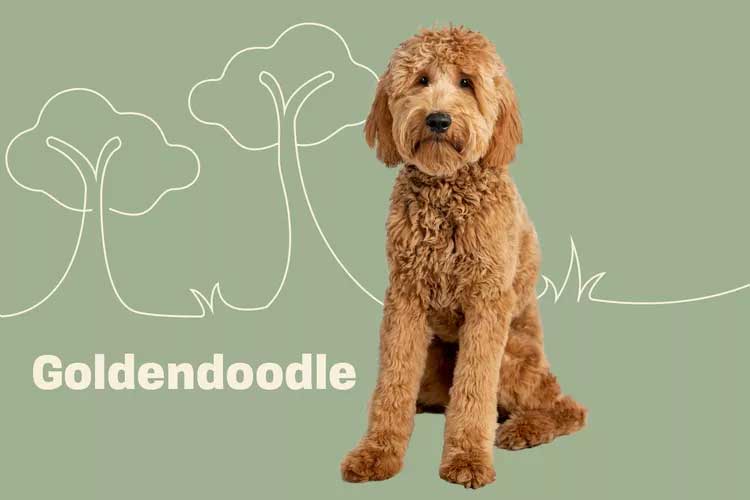
Goldendoodle Overview
| OFFICIAL NAME | Goldendoodle |
| COMMON NAME | Goldendoodle |
| PET HEIGHT | 17 to 21 inches |
| PET WEIGHT | 50 to 90 pounds |
| LIFESPAN | 10 to 15 years |
| GOOD WITH | cats, children, dogs, families |
| TEMPERAMENT | friendly, gentle, outgoing, playful |
| INTELLIGENCE | high |
| SHEDDING AMOUNT | infrequent |
| EXERCISE NEEDS | medium |
| ENERGY LEVEL | active |
| VOCAL LEVEL | when necessary |
| DROOL AMOUNT | low |
| BREED GROUP | hybrid |
| BREED SIZE | large (61-100 lbs.) |
| COAT LENGTH | curly, medium |
| COLORS | black, blue, brown / chocolate / liver, cream, fawn, gold / yellow, gray, red, white |
| PATTERNS | bicolor, black and tan, brindle, merle |
| OTHER TRAITS | easy to train, good for first-time pet owners, good hiking companion, hypoallergenic, loves water, low prey drive, requires lots of grooming, strong loyalty tendencies |
The beloved goldendoodle, a golden retriever and poodle hybrid, earns popularity points for his affectionate nature as well as his beautiful (and allergen-friendly!) coat.
Available in both the larger standard size and as a smaller miniature, goldendoodles are playful yet gentle dogs that crave human interaction. They do best with daily walks or outdoor play sessions to fill their physical fitness needs and, because both of their parent breeds are friendly and highly intelligent, goldendoodles are ideal for families with small children, first-time dog owners, and as emotional support animals.
Appearance
Because poodles range in size more than golden retrievers, a goldendoodle's height and weight depend largely on his poodle lineage. Specifically, a standard poodle will result in a full-size goldendoodle, while a miniature poodle parent likely reduces a pup's full-grown stature. Standard doodles can stand more than 21 inches tall and weigh up to 100 pounds. Miniature goldendoodles typically weigh no more than 35 pounds and stand less than 14–17 inches tall.While golden retrievers have coats that stick to the wheat or golden range, a poodle can be one of many colors—this variation also shows up in goldendoodles. While the teddy bear gold hue might be the most popular, breeding can also result in black, white, brown, cream, and red goldendoodles. In very rare cases, a pup bred from multiple generations of doodles will have recessive color traits such as gray, blue, or even be multi-colored. The most common eye color for this breed is brown.
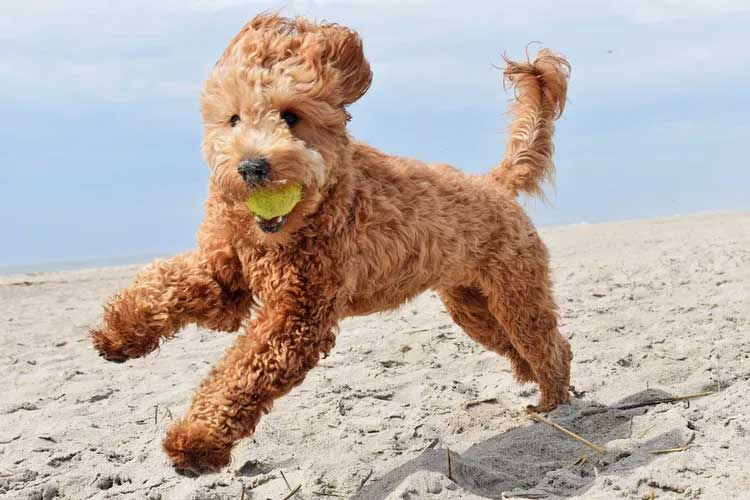
Perhaps one of the biggest appeals of goldendoodles is their "hypoallergenic" coat. As a descendant of the poodle—a popular option for dog owners with allergies—a goldendoodle doesn't shed much, which means they can be a good fit for people who tend to sneeze or itch around pups. For owners who want a big dog that doesn't shed, a doodle that's 75 percent standard poodle and 25 percent golden retriever (known as an F1B goldendoodle) is a good option. These inherit a curlier poodle coat that's better for those with dog allergies.
A goldendoodle can have very curly, poodle-like locks or inherit a more wavy mane from their retriever parent. And despite their allergen-friendly fur, doodles have a double coat that consists of a dense undercoat of short hairs beneath a top coat of longer hairs, called guard hairs. Dogs with this layered fur need regular brushing.
Temperament
Goldendoodles get their gentle nature from their golden retriever side, making them a wonderful option for families with young children. They're naturally inclined to be careful with infants and toddlers, and will be patient companions for children as they grow up. However, as with any breed, you still need to supervise small kiddos and dogs, and make sure your children learn how to properly interact with pets.As extremely affectionate dogs, they love to socialize and rarely meet a human or fellow animal they don't like—even smaller critters like cats. Instead of wanting to chase, goldendoodles are laid-back and almost bashful.
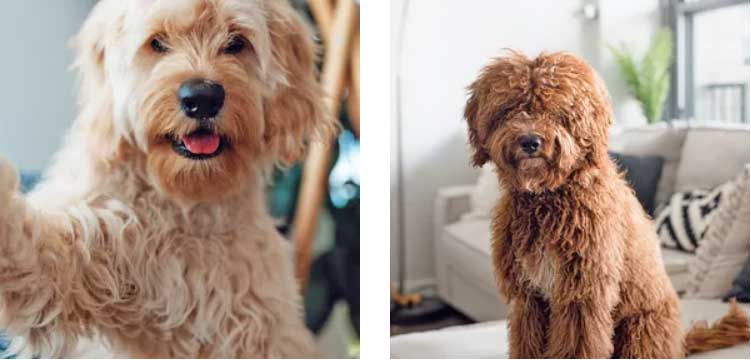
They're also incredibly trainable, thanks to the big brains they inherit from both parents. Both poodles and golden retrievers score in the top five of the 150 smartest dog breeds, according to the Goldendoodle Association of North America. So while playful, these pups are obedient with the proper training. They can learn some fun tricks, too.
Near the foothills of the Appalachian mountains, Lynne Whitmire has been breeding goldendoodles for over 15 years. The GANA blue ribbon breeder believes the goldendoodle's temperament is one of the best things about them. "They're not happy unless they're with their people," Whitmire says. "They think they are a full-fledged family member."
Living Needs
A goldendoodle will require daily play and exercise, whether that's a morning walk or a backyard fetch session—or both! With such an easygoing attitude, they'll flourish with additional playmates (dogs and humans alike). Doodles are also known for loving water; swimming gives them another outlet to get their exercise.While outdoor time is still important, a miniature goldendoodle is more apt to enjoy apartment living than a standard-size doodle. And as long as your pup has been properly trained and socialized, neither the standard or miniature goldendoodles are excessive barkers, so you won't have to worry about any grumpy neighbors.
Care
Even with little to no shedding, goldendoodles, like all poodles and poodle hybrids, still need consistent grooming to keep their coat healthy. They'll need to see a professional groomer every 6–8 weeks, but won't need much bathing beyond that. Frequent baths can actually cause dry skin, so experts recommend only bathing doodles if they're smelly or dirty.The curlier the coat, the more often they'll need to be brushed. But in general, a goldendoodle needs daily brushing to avoid painful matting. However, if they have a straight coat or a very short hairdo, weekly brushing sessions will be sufficient.
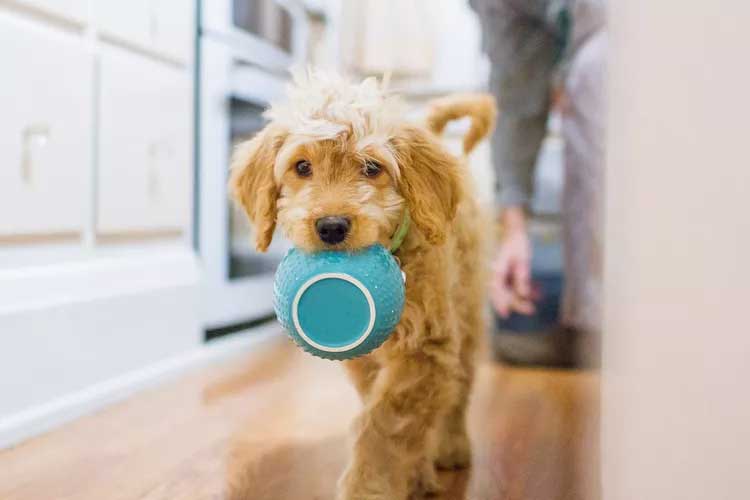
Goldendoodles of all sizes need about half an hour of physical activity every day. A fenced backyard makes exercise easy, but a brisk walk around the neighborhood will also do.
"They love water, they love to hike, but they also love being a couch potato," Whitmire says.
Doodles love social interaction with humans and playdates with fellow pups, so they generally shouldn't be left home alone for long periods of time. A lonely or bored goldendoodle can develop separation anxiety and exhibit undesirable behaviors, including digging or barking. Proper socialization and attention should start early and continue throughout the dog's life to ensure good behaviors.
Quick to learn and eager to please, these pooches are excellent for first-time dog owners. As with all breeds, they do best with positive reinforcement training and rewarding good behavior with treats. Even a young goldendoodle puppy can learn tricks and obedience through early training and socialization.
Health
Goldendoodles have a lifespan of 10–15 years, and in general they're very healthy dogs. But, as with all breeds, they can be susceptible to certain health issues."We know that goldendoodles are sensitive to atopic dermatitis, ruptured cranial cruciate ligaments in the knees, seizures, hip dysplasia, patella luxation, a blood clotting disorder known as von Willebrand Disease, and an eye condition known as progressive retinal atrophy," says Adam Christman, DVM, of Brick, N.J.
Varying types of cancer can also be passed down from the golden retriever parent, so a health clearance is important to ensure a healthy pup. Consult your veterinarian about warning signs to look out for.
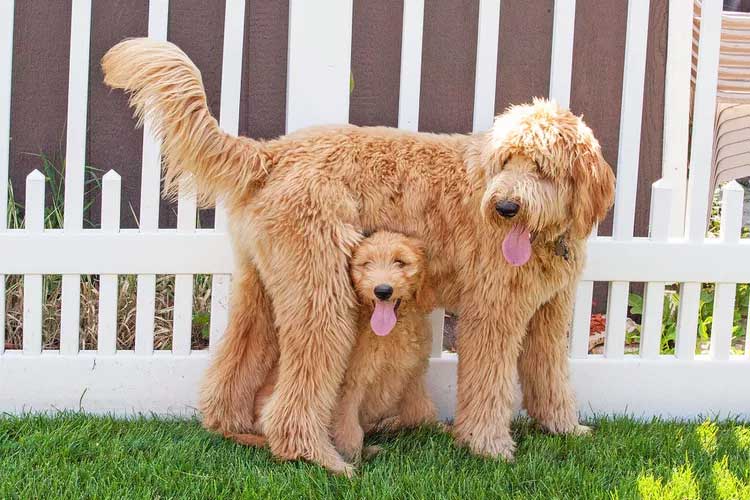
Because doodles are naturally water-loving pups, they may be more prone to ear infections than other dogs. Their floppy ears can trap moisture, so owners should clean their dog's ears soon after any water-related activities or bathtime.
As with any new puppy, it's important to request a health clearance from the breeder. And all reputable breeders should conduct the appropriate health tests and provide documentation when you buy your goldendoodle puppy. Because this hybrid is so popular, you need to do your research before working with any breeder. As a general rule, avoid breeders who sell multiple mixed breeds, offer to ship puppies, are difficult to contact, or don't let you meet your puppy's parents.
"Doing your research and identifying reputable breeders is crucial," Christman says. "This breed has been around for many years now and we have some excellent research supporting the breed predisposition."
History
While the exact origin of the goldendoodle crossbreed is unknown, breeders began to market these dapper doodles in the 1990s after the Labradoodle (a Labrador retriever bred with a poodle) gained popularity. In fact, goldendoodles have many similar characteristics to that earlier hybrid.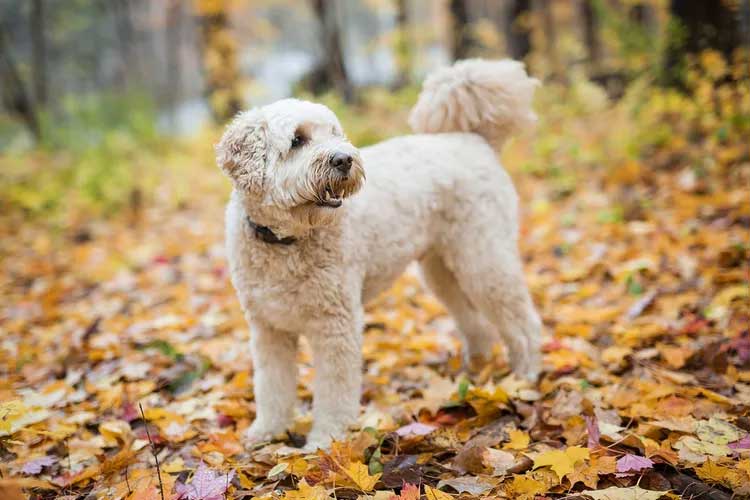
One of the biggest appeals of both crossbreeds is their coat, which is considered hypoallergenic. However, goldendoodle coats can be longer and wavier, thanks to their golden retriever genes. Labradoodles, on average, are also slightly larger.
Although both types of doodles are very friendly, goldens are generally more enthusiastic about meeting new people. They inherit a social, happy-go-lucky attitude from the golden retriever that differentiates them slightly from their Lab-mix cousins. Labradoodles were created to be guide dogs, and goldendoodles are also commonly used as emotional support animals and therapy dogs.
As goldendoodles gained popularity, breeders began taking requests for more variations. They introduced new sizes and traits to please all sorts of dog owners: petites and minis, unique colors, curlier or straighter coats. The goldendoodle may be one of the newest poodle mix crossbreeds, but the breed's popularity is still on the rise.
Fun Facts
“Groodles” have a huge fanbase in the land down under. We have Aussies to thank for the growing popularity (and the cool name variation). The breed also goes by “golden poos,” “goldie poos,” or “curly goldens.”Among those who love goldendoodles is Paula Deen. The TV personality and cookbook author has a cream goldendoodle named Gus, who loves to eat her homemade peanut butter dog biscuits. Other celebs with goldendoodles include Perez Hilton, Usher, Jensen Ackles, and Kenny Chesney.
These dogs don’t need a celebrity to be famous. Meet Samson the goldendoodle, who has more than 1 million followers on Instagram.